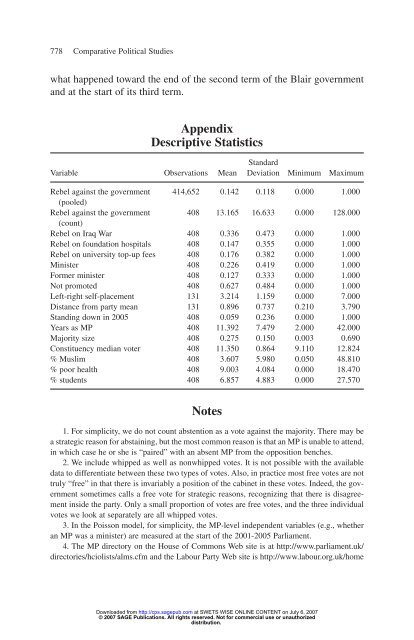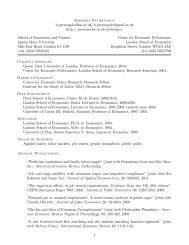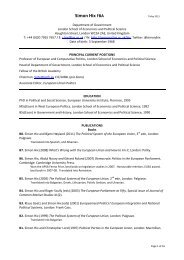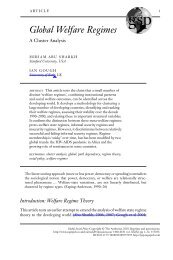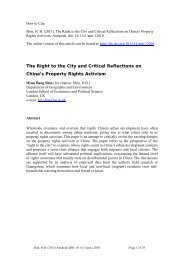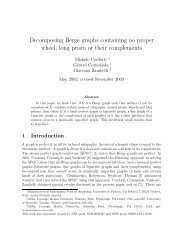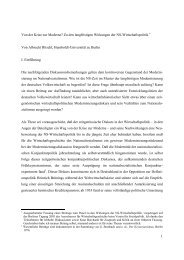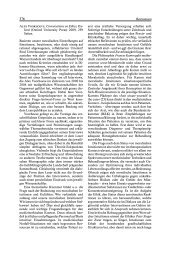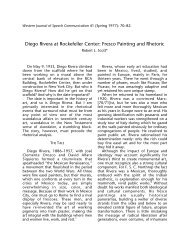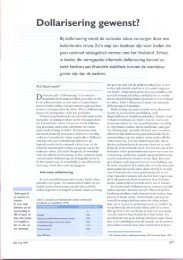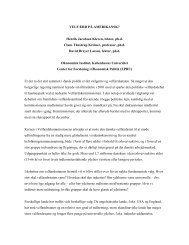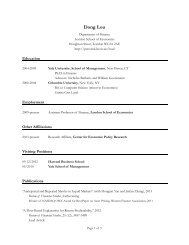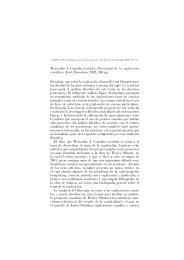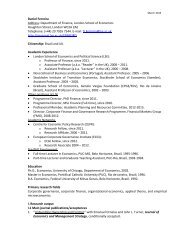The Rejected, the Ejected, and the Dejected: Explaining ...
The Rejected, the Ejected, and the Dejected: Explaining ...
The Rejected, the Ejected, and the Dejected: Explaining ...
Create successful ePaper yourself
Turn your PDF publications into a flip-book with our unique Google optimized e-Paper software.
778 Comparative Political Studies<br />
what happened toward <strong>the</strong> end of <strong>the</strong> second term of <strong>the</strong> Blair government<br />
<strong>and</strong> at <strong>the</strong> start of its third term.<br />
Appendix<br />
Descriptive Statistics<br />
St<strong>and</strong>ard<br />
Variable Observations Mean Deviation Minimum Maximum<br />
Rebel against <strong>the</strong> government 414,652 0.142 0.118 0.000 1.000<br />
(pooled)<br />
Rebel against <strong>the</strong> government 408 13.165 16.633 0.000 128.000<br />
(count)<br />
Rebel on Iraq War 408 0.336 0.473 0.000 1.000<br />
Rebel on foundation hospitals 408 0.147 0.355 0.000 1.000<br />
Rebel on university top-up fees 408 0.176 0.382 0.000 1.000<br />
Minister 408 0.226 0.419 0.000 1.000<br />
Former minister 408 0.127 0.333 0.000 1.000<br />
Not promoted 408 0.627 0.484 0.000 1.000<br />
Left-right self-placement 131 3.214 1.159 0.000 7.000<br />
Distance from party mean 131 0.896 0.737 0.210 3.790<br />
St<strong>and</strong>ing down in 2005 408 0.059 0.236 0.000 1.000<br />
Years as MP 408 11.392 7.479 2.000 42.000<br />
Majority size 408 0.275 0.150 0.003 0.690<br />
Constituency median voter 408 11.350 0.864 9.110 12.824<br />
% Muslim 408 3.607 5.980 0.050 48.810<br />
% poor health 408 9.003 4.084 0.000 18.470<br />
% students 408 6.857 4.883 0.000 27.570<br />
Notes<br />
1. For simplicity, we do not count abstention as a vote against <strong>the</strong> majority. <strong>The</strong>re may be<br />
a strategic reason for abstaining, but <strong>the</strong> most common reason is that an MP is unable to attend,<br />
in which case he or she is “paired” with an absent MP from <strong>the</strong> opposition benches.<br />
2. We include whipped as well as nonwhipped votes. It is not possible with <strong>the</strong> available<br />
data to differentiate between <strong>the</strong>se two types of votes. Also, in practice most free votes are not<br />
truly “free” in that <strong>the</strong>re is invariably a position of <strong>the</strong> cabinet in <strong>the</strong>se votes. Indeed, <strong>the</strong> government<br />
sometimes calls a free vote for strategic reasons, recognizing that <strong>the</strong>re is disagreement<br />
inside <strong>the</strong> party. Only a small proportion of votes are free votes, <strong>and</strong> <strong>the</strong> three individual<br />
votes we look at separately are all whipped votes.<br />
3. In <strong>the</strong> Poisson model, for simplicity, <strong>the</strong> MP-level independent variables (e.g., whe<strong>the</strong>r<br />
an MP was a minister) are measured at <strong>the</strong> start of <strong>the</strong> 2001-2005 Parliament.<br />
4. <strong>The</strong> MP directory on <strong>the</strong> House of Commons Web site is at http://www.parliament.uk/<br />
directories/hciolists/alms.cfm <strong>and</strong> <strong>the</strong> Labour Party Web site is http://www.labour.org.uk/home<br />
Downloaded from<br />
http://cps.sagepub.com at SWETS WISE ONLINE CONTENT on July 6, 2007<br />
© 2007 SAGE Publications. All rights reserved. Not for commercial use or unauthorized<br />
distribution.


